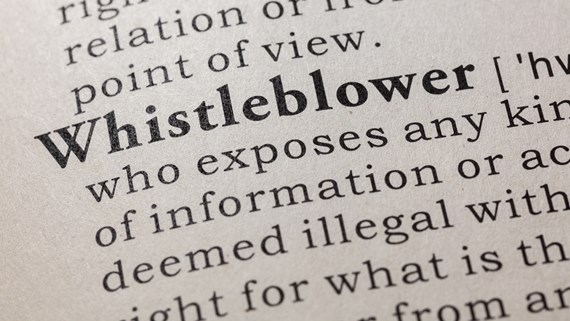Whistleblowing: recent EAT cases and possible reform
Blog

As election day looms and speculation about its outcome grows, we thought we would bring good news (for now) for employers in the form of three recent Employment Appeal Tribunal (EAT) whistleblowing cases, which add additional hurdles for claimants in bringing a successful whistleblowing claim.
The law
Before we get into the case law weeds, a quick whistlestop tour (pun very much intended) of the relevant law. In summary, ‘workers’ (which has a wider statutory definition than the ordinary meaning of worker and includes employees, workers who are not employees and others) who report suspected wrongdoing in the workplace have statutory protection against detriment and dismissal.
Protected disclosure
For an eligible individual to qualify for the statutory protections, they must first prove they have made a qualifying disclosure: i. there must be a disclosure of information; ii. which in the reasonable belief of the individual tends to show one or more of the six types of malpractice specified in the statute; and iii. the individual must have a reasonable belief that the disclosure is in the public interest.
The individual must then prove that the qualifying disclosure is protected. Whether a disclosure is protected depends on who the information is disclosed to; this should ordinarily be the individual’s employer although the legislation does also allow for external disclosures to third parties in some cases.
Causation
The individual then needs to prove that the protected disclosure caused either the detrimental treatment or was the reason (or principal reason) for the dismissal. It is causation that is the rock that whistleblowing claims tend to founder on as evidenced by two recent EAT cases: Nicol v World Travel and Tourism, and William v Lewisham & Greenwich NHS Trust.
Recent whistleblowing cases
Nicol v World Travel and Tourism - the decision-maker must know the substance of the disclosure
In this case involving a claim for automatic unfair dismissal, it was accepted that the Claimant had made protected disclosures to an individual at the organisation and that the decision-maker of the dismissal was made aware of the fact of (but crucially not the substance of) the disclosures. The EAT held that the employer was not liable for automatic unfair dismissal as the decision-maker was not aware of the substance of the protected disclosures and therefore the protected disclosures were not the sole or principal reason for the dismissal, i.e. causation was not made out. This case highlights the need for a decision maker to have some knowledge of what the employee’s concerns are about in order for whistleblowing liability to arise.
William v Lewisham & Greenwich NHS Trust - for detriment claims, the only relevant knowledge and motive is that of the decision-maker
This was a whistleblowing detriment claim brought by a consultant paediatrician (the Claimant). The Claimant claimed she had made various protected disclosures and was subject to detriments, which the Employment Tribunal (ET) accepted. However, the ET found that the individuals responsible for the detrimental treatment were unaware of the protected disclosures and therefore the protected disclosures did not have a material influence on their decisions so again, causation was not made out.
The Claimant appealed and argued that actions of other doctors, who knew of the protected disclosures, had influenced the Trust in subjecting her to detriments and that the EAT should therefore apply the Supreme Court’s decision in Royal Mail Group v Jhuti (2019) which held that if a person in the hierarchy of responsibility above the employee determines that she (or he) should be dismissed for a reason, but hides it behind an invented reason which the decision-maker adopts, the reason for the dismissal is the hidden reason rather than the invented reason (see David Hunt’s blog here). The EAT rejected this argument drawing the distinction between detriment claims and claims for automatic unfair dismissal. For detriment claims, the only relevant knowledge and motive is that of the decision-maker.
Sullivan v Isle of White Council – job applicants cannot bring whistleblowing detriment claims
In this case, the EAT confirmed that job applicants cannot bring a whistleblowing detriment claim against a prospective employer. The EAT rejected the Claimant’s arguments that a wider statutory interpretation of ‘worker’ should be applied and held that any extension would need to be an amendment for Parliament to take (which depending on the outcome of the general election may happen).
Whistleblowing law reform on the horizon?
The cases above will be welcome news to employers, however, change is certainly afoot in this area so how long these principles will apply is uncertain.
Last year we reported on the Conservative government’s review of the current whistleblowing legislative framework (see Caitlin Farrar’s blog here). The resulting Whistleblowing Bill (which, amongst other things, proposes a new Office of the Whistleblower and new civil and criminal offences for subjecting whistleblowers to detriment) had its first reading in the House of Commons in January of this year but is now on ice as the election approaches.
Labour have also committed to whistleblowing reform if they win the election, albeit this is not a cornerstone of Labour’s recently published Plan to make work pay. The New Deal for Working People contains a comparatively short commitment to whistleblowing reform: “Labour will strengthen protection for whistleblowers, including by updating protection for women who report sexual harassment at work”. Labour have also separately pledged to offer financial rewards to whistleblowers who expose stolen assets, sanctions breaches and recover misappropriated funds; a policy already in force in other jurisdictions, most notably, the USA.
It is not yet clear what either party’s precise plans are in regards whistleblowing but what is clear is that both parties are looking to initiate some sort of reform in this area. For now though, the courts’ treatment of whistleblowing claims continues to be favourable for employers. However, as with so many areas of employment law right now, the message is watch this space.
This publication is a general summary of the law. It should not replace legal advice tailored to your specific circumstances.
© Farrer & Co LLP, June 2024







